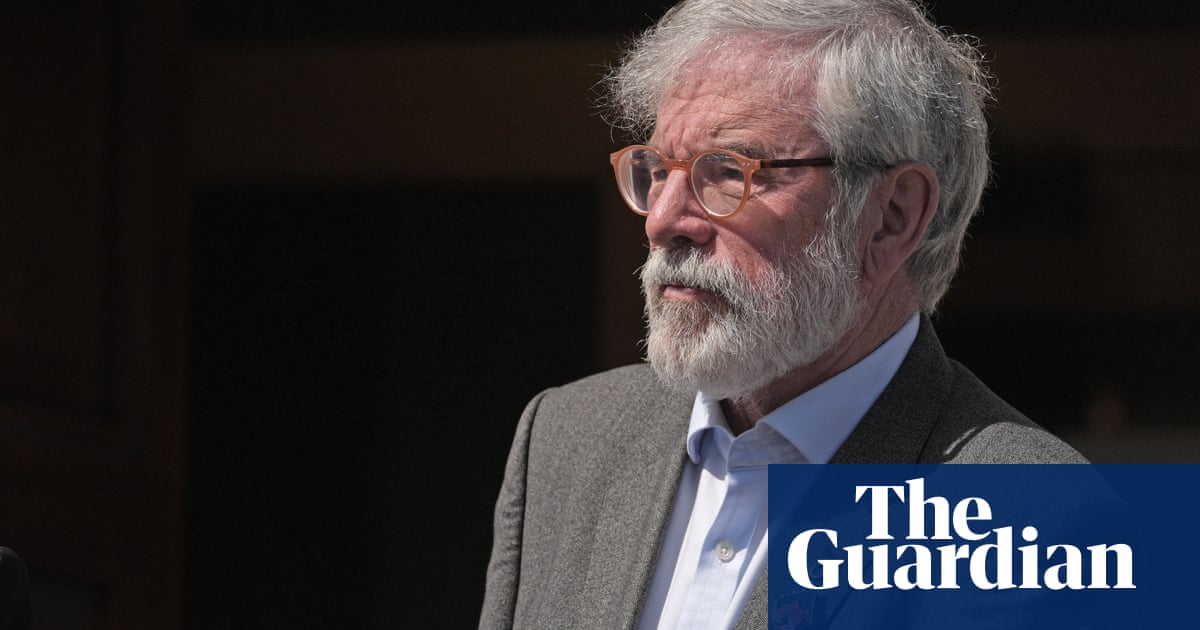It is a small, compact courtroom with a digital clock that glows beneath the judge’s bench, but the evidence unfurled in the case ofGerry Adamsversus the BBC is expansive and spans decades of Irish and British history.
The former Sinn Féin leader’s childhood and political awakening, the evolution of the Troubles, theIRA’s deadly campaign, the peace process, the murder of a British spy, all have been outlined – and contested – in the libel hearing at Dublin’s high court.
Adams is suing the BBC for defamation over a documentary and accompanying online article that carried a claim that he sanctioned a killing in 2006, a claim that he says is false and smeared his reputation as a peacemaker. The BBC said the programme and article had complied with editorial guidelines and offered Adams an opportunity to give a statement or interview.
During two weeks of evidence – it is now the midpoint of what is expected to be a four-week trial – both sides have laid out competing versions of Adams’ reputation before a jury and a packed public gallery, with Adams taking centre stage in the witness box. The 76-year-old repeatedly denied ever being a member of the IRA. “It wasn’t a path that I took,” he said.
The former West Belfast MP claims a BBC Spotlight documentary and online story was “an attempted hatchet job” that defamed him by claiming he sanctioned the murder ofDenis Donaldson, a former senior Sinn Féin official who was shot dead in County Donegal in 2006 months after admitting that he had for decades been a police and MI5 informant.
The Real IRA, a dissident group, admitted the killing in 2009. In September 2016 the BBC documentary, which was shown in court, included an interview with an anonymous source known as “Martin” who alleged Adams sanctioned the murder.
Ciarán Shiels, a solicitor who used to represent Donaldson’s family, told the court that the BBC was not only “barking up the wrong tree” but was in the “wrong orchard” over the claims against Adams. A lawyer for the BBC said five other sources – who did not appear in the documentary – corroborated the allegation made by Martin.
Adams’ barrister, Tom Hogan, accused the broadcaster of “reckless journalism” and making an “unjustified” attack on Adams. “He is credited, with others, in bringing about the peace process in Northern Ireland. Gerry Adams’ reputation is that of a peacemaker. It has taken Gerry Adams a lifetime to gain that reputation. The essence of this case is an unjustified attack on his reputation.”
Called as the first witness, Adams related his upbringing in Belfast, his desire to be a hurling champion, the civil rights movement inNorthern Irelandand the explosion of violence in 1969.
He said the IRA’s armed campaign was “a legitimate response” to British military occupation, but that not everything the IRA did was legitimate. He outlined his efforts to pursue “an alternative way forward” to violence, culminating in IRA ceasefires in the 1990s that paved the way to the 1998 Good Friday agreement. The former MP said the Spotlight documentary was a “grievous smear” that suggested his work for peace had been a “scam”.
Under cross-examination by Paul Gallagher, a barrister for the BBC, the focus shifted to longstanding allegations that Adams was a senior IRA commander and his level of knowledge, or support, for specific IRA operations.
The jury was shown a montage of news and documentary clips stretching back decades that included interviews with Adams and other Irish republicans. Adams said that Seán Mac Stíofáin, a reputed IRA chief of staff, was “mistaken” to claim in one of the clips that Adams was in the IRA.
The montage included a clip from a 1987 press conference in which Adams was asked about the murder of an alleged informer named Charles McIlmurray. “Mr McIlmurray, like anyone living in west Belfast knows, that the consequence of informing is death,” he said in the clip. Under cross-examination, Adams said his remark was “very harsh” but that he had expressed commiserations to the victim’s family.
Sign up toFirst Edition
Our morning email breaks down the key stories of the day, telling you what’s happening and why it matters
after newsletter promotion
Adams was asked about the book Say Nothing by the US journalist Patrick Radden Keefe, and the spin-offDisney TV dramaof the same name, which explored the murder ofJean McConville, a mother-of-10 who was abducted and “disappeared” by the IRA in 1972. Adams said he had not read the book or seen the series. “Life’s too short to watch Disney, especially when it’s dealing with serious issues.”
Asked if he knew about IRA rules and structures, he replied: “I don’t intend to speculate on any of those issues in relation to the IRA.” Adams said he wrote occasional articles under the pseudonym Brownie but did not write a particular Brownie article in which the author professed membership of the IRA.
Judge Alexander Owens asked Adams to elaborate on previous comments about the1984 Brighton bombing, which killed five people in a failed attempt to wipe out Margaret Thatcher and her cabinet.
Adams said he had reservations about civilians being killed, and that the IRA committed “reprehensible” acts, but considered the Brighton attack a “legitimate response by the IRA to what Margaret Thatcher was doing in our country”. Asked if wiping out the Conservative leadership would have helped the peace process, Adams said: “I don’t think it’s up to me to speculate on, it didn’t happen. But we did succeed in bringing about peace.”
The trial continues.
